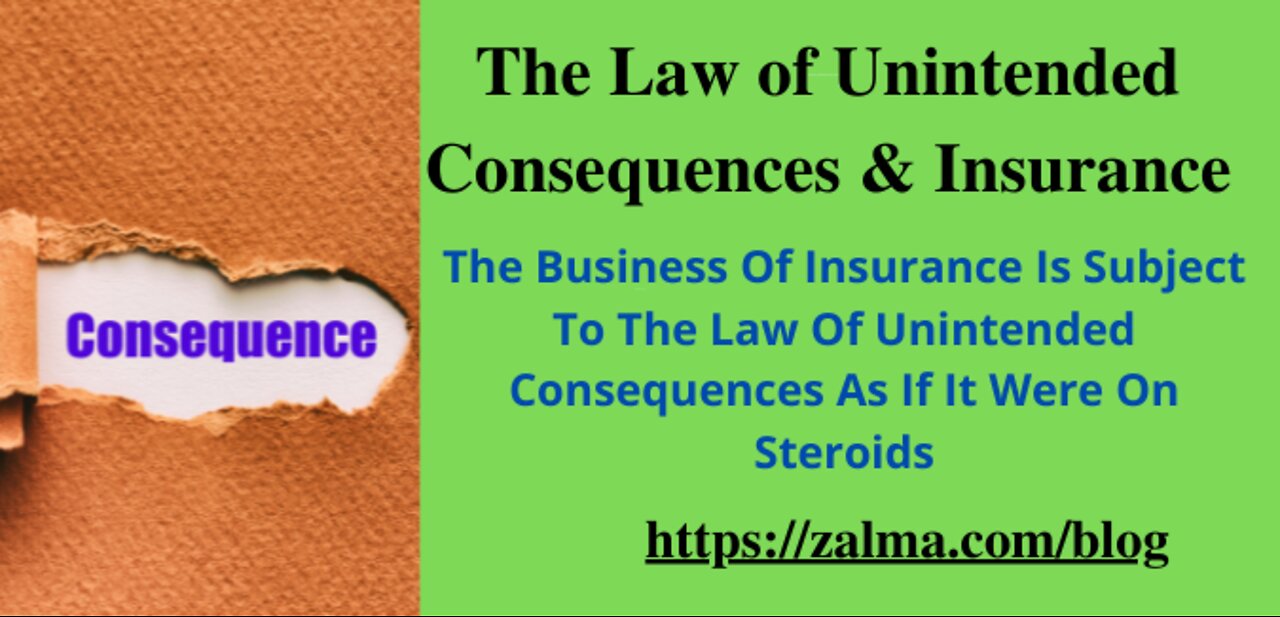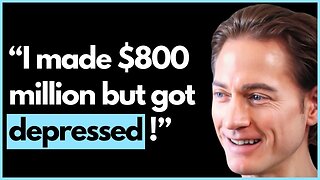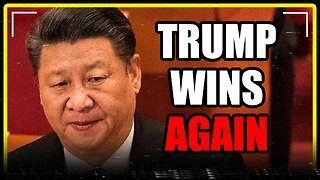Premium Only Content

The Law of Unintended Consequences & Insurance
The Business Of Insurance Is Subject To The Law Of Unintended Consequences As If It Were On Steroids
The law of unintended consequences is not statutory. No state or federal government has enacted it into law. No executive has signed the law. It is, rather, a law of the nature of people. It is an adage or idiomatic warning that an intervention in a complex system always creates unanticipated and often undesirable outcomes.
General observation requires the hypothesis that actions of people, especially of governments, will always have effects that are unanticipated or unintended, has been proved. Economists and other social scientists have heeded its power for centuries. Regardless, for just as long, politicians, insurers and popular opinion have largely ignored the law of unintended consequences to their detriment.
There is no common-law duty for a court, especially in a heavily regulated sector of the economy like insurance to create new rules. Every court should be loathe to invent duties unmoored to any existing precedent. The law of unintended consequences counsels against it.
A good illustration of the law of unintended consequences can be
To find a good illustration of the law of unintended consequences, one need look no further than the Supreme Court's decision in Williamson County Regional Planning Comm'n v. Hamilton Bank of Johnson City, 473 U.S. 172, 105 S.Ct. 3108, 87 L.Ed.2d 126 (1985). The Court's actual holding was pedestrian: that Hamilton Bank's takings claim was unripe because the bank had not exhausted its administrative remedies, specifically its right to ask the County for a variance to develop the property in the manner proposed. In dictum, however—dictum in the sense that the Court's pronouncement was at that point unnecessary to its decision—the Court went on to say that the bank's claim was "not yet ripe" for a "second reason. That reason too was couched in terms of exhaustion: that under state law "a property owner may bring an inverse condemnation action to obtain just compensation for an alleged taking of property"; and that, until the bank "has utilized that procedure, its takings claim is premature." The Court's implicit assurance, of course, was that once a plaintiff checks these boxes, it can bring its takings claim back to federal court.
That assurance proved illusory. State-court judgments are things to which the federal courts owe full faith and credit. That obligation means that takings claims litigated in state court cannot be relitigated in federal. Thus—by all appearances inadvertently— Williamson County all but guarantees that claimants will be unable to utilize the federal courts to enforce the Fifth Amendment's just compensation guarantee against state and local governments. [Lumbard v. City of Ann Arbor, 913 F.3d 585 (6th Cir. 2019)]
The law of unintended consequences applies as much in jurisprudence as anywhere else; bending a rule to accommodate one litigant doesn't always achieve better justice — sometimes it just sows confusion in anyone trying to figure out what a court might do in other cases in the future. A prudent court will take the lesson to leave rulemaking to the legislators and administrators, even when the outcome appears unjust. The orderly development of the law is not without rough patches, but it is better than living under the law of unintended consequences. [United States ex rel. Prather v. Brookdale Senior Living Cmtys., Inc., 892 F.3d 822 (6th Cir. 2018)]
In addition, as one dissenter said that the majority’s desire to cure all wrongs by eviscerating the doctrine of governmental immunity, while well-intentioned, is fraught with the law of unintended consequences. Depriving governmental officials of governmental immunity when making policy decisions, when making sentencing decisions, and when running the government would certainly cause most of us to rethink the traditional notion of public service. [Doe v. Dep't of Corr., 323 Mich.App. 479, 917 N.W.2d 730 (Mich. App. 2018)]
Philosophers, Economists and Politicians
The concept of unintended consequences is one of the building blocks of economics. Adam Smith’s “invisible hand,” the most famous metaphor in social science, is an example of a positive unintended consequence. Smith maintained that each individual, seeking only his own gain, “is led by an invisible hand to promote an end which was no part of his intention,” that end being the public interest. “It is not from the benevolence of the butcher, or the baker, that we expect our dinner,” Smith wrote, “but from regard to their own self-interest.”
Most often, however, the law of unintended consequences illuminates the perverse unanticipated effects of legislation, regulation and the decisions of appellate courts. In 1692 the English philosopher John Locke, a forerunner of modern economists, urged the defeat of a parliamentary bill designed to cut the maximum permissible rate of interest from 6 percent to 4 percent.
The law of unintended consequences provides the basis for many criticisms of government programs. Unintended consequences can add so much to the costs of some programs that they make the programs unwise even if they achieve their stated goals. For instance, the U.S. government-imposed quotas on imports of steel in order to protect steel companies and steelworkers from lower-priced competition. The quotas do help steel companies. But they also make less of the cheap steel available to U.S. automakers. As a result, the automakers have to pay more for steel than their foreign competitors do. So, a policy that protects one industry from foreign competition makes it harder for another industry to compete with imports.
Similarly, Social Security has helped alleviate poverty among senior citizens and the disabled. Many economists argue, however, that it has carried a cost that goes beyond the payroll taxes levied on workers and employers. Martin Feldstein, and others, maintain that today’s workers save less for their old age because they know they will receive Social Security checks when they retire. If Feldstein and the others are correct, it means that less savings are available, less investment takes place, and the economy and wages grow more slowly than they would without Social Security.
The law of unintended consequences is at work always and everywhere. People outraged about high prices of plywood in areas devastated by hurricanes, for example, may advocate price controls to keep the prices closer to usual levels. An unintended consequence is that suppliers of plywood from outside the region, who would have been willing to supply plywood quickly at the higher market price, are less willing to do so at the government-controlled price. Thus, a shortage of a good resulted where it was badly needed.
Insurance is controlled by the courts, through appellate decisions, and by governmental agencies, through statute and regulation. Compliance with the appellate decisions, statutes, and regulations—different in the various states—is exceedingly difficult and expensive.
In the United States alone, people pay insurers more than $1.2 trillion in premiums, and insurers pay out in claims and expenses as much or more than they take in. Profit margins are small because competition is fierce, and a year’s profits can be lost to a single firestorm, hurricane, or flood.
(c) 2022 Barry Zalma & ClaimSchool, Inc.
Barry Zalma, Esq., CFE, now limits his practice to service as an insurance consultant specializing in insurance coverage, insurance claims handling, insurance bad faith and insurance fraud almost equally for insurers and policyholders. He practiced law in California for more than 44 years as an insurance coverage and claims handling lawyer and more than 54 years in the insurance business. He is available at http://www.zalma.com and zalma@zalma.com.
Subscribe to Zalma on Insurance at locals.com https://zalmaoninsurance.local.com/subscribe.
Subscribe to Excellence in Claims Handling at https://barryzalma.substack.com/welcome.
Write to Mr. Zalma at zalma@zalma.com; http://www.zalma.com; http://zalma.com/blog; daily articles are published at https://zalma.substack.com. Go to the podcast Zalma On Insurance at https://anchor.fm/barry-zalma; Follow Mr. Zalma on Twitter at https://twitter.com/bzalma; Go to Barry Zalma videos at Rumble.com at https://rumble.com/c/c-262921; Go to Barry Zalma on YouTube- https://www.youtube.com/channel/UCysiZklEtxZsSF9DfC0Expg; Go to the Insurance Claims Library – https://zalma.com/blog/insurance-claims-library/
-
 7:40
7:40
Barry Zalma, Inc. on Insurance Law
1 year agoLoss of Inventory by Bankruptcy
184 -
 29:10
29:10
reallygraceful
17 hours ago $1.32 earnedWill GHISLAINE MAXWELL Be a Free Woman Soon?
1.67K26 -
 4:25
4:25
Blackstone Griddles
13 hours agoBetty's Outback Chicken on the Blackstone Griddle
5772 -
 8:48
8:48
Hollywood Exposed
14 hours agoRob Schneider Just ENDED Stephen Colbert’s Career With ONE Brutal Truth
24 -
 12:14
12:14
Nikko Ortiz
2 days agoMilitary Fails Of The Week
38.7K16 -
 27:37
27:37
pewculture
7 days agoThe I, Robot Gun Looked Cool—Until We Found Out What It Really Was - EP#23 - I, Robot
6.12K5 -
 56:00
56:00
Omar Elattar
9 months agoHow I Made $800M, Got Depressed & Now Spend $2M Per-Year On My Anti-Aging Health Routine!
14.1K -
 24:24
24:24
GritsGG
14 hours agoSpectating Random Solos with the Rank 1 Player - Pro Strategies!
6.26K -
 LIVE
LIVE
Lofi Girl
2 years agoSynthwave Radio 🌌 - beats to chill/game to
362 watching -
 9:27
9:27
MattMorseTV
2 days ago $17.85 earnedHe just lost EVERYTHING.
76K117